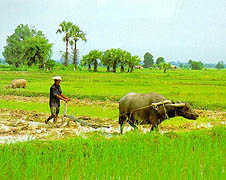
Catholic Church workers are skeptical over the Thai government’s recent announcement about a nine-point public welfare package, saying it does little to address problems in society. Prime Minister Abhisit Vejjajiva on Jan. 9 announced the initiative to assist low-income and underprivileged people. The package called the “nine gifts” include extension of the social security scheme to self-employed people in the informal sector, low interest loans for taxi drivers and street vendors, registration of taxi motorcyclists so that they can be included in welfare schemes, and creating more space for 20,000 street vendors. The scheme would also include subsidizing cooking gas for households, free electricity for the more than 9 million households using less than 90 units a month and capping prices of food and agricultural produce. “The scheme for the informal sector is very good. But the government should expand this to include sustainable welfare, for example the right to set up labor unions in the informal sector with government support,” said Father Suwat Luaeng-sa-ard, secretary of Caritas Thailand. On controlling the prices of food, he remarked: “This is just a populist policy because the government has to use the people’s taxes to cover the cost. Moreover, it can be carried out only for a short period.” Rather, the government should find ways of increasing the capacity from farmers, he said. Father Thanu Jedsadaphongphakdee, director of the Social Action Center of Bangkok archdiocese, acknowledged that supporting farmers is a positive step but warned about creating a dependency among farmers. “The government needs to build farmers’ strength so that they can be independent.” Sarawut Prathumraj, board member of the Catholic Commission for Justice and Peace, said the “nine gifts” was “clearly aimed at political benefit” and an attempt to defuse tensions arising because of the “red shirts” monthly protests. “This scheme clearly does not solve problems at their root cause,” he said and outlined two basic measures to solve problems. First, there should be proper tax collection. For example, those who own a lot of land and not using it need to pay high taxes or at least distribute land to farmers to be properly used. This would create a proper income distribution among the rural people. Next, the government needs to urge the local administration to promote sustainable development and reduce corruption. If the government can solve the corruption problem, this will strengthen the rural people automatically. “If they have justice and land to work on properly, they do not need to move to town,” he said. Related reports Vested interests the cause of southern Thai conflict Thais back end to centralized TH12788.1636


